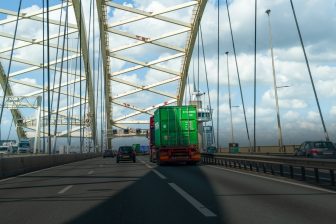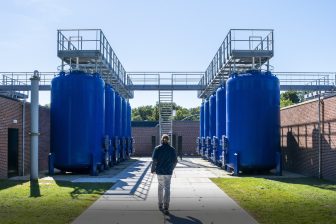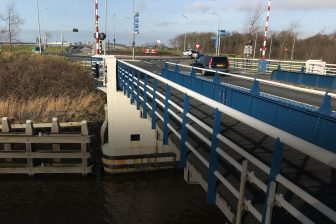Alstom strengthens its commitment to Morocco
With a very high speed train outline agreement and contracts in rail transport
and power generation
Alstom strengthens its commitment to Morocco in a long-term partnership
founded on technology and sustainable development
Signed on Monday, 22 October during the visit of the President of the French Republic, the outline agreement between the Kingdom of Morocco and France plans to award French industry, and in
particular, Alstom, a partner alongside SNCF and RFF in the world rail speed record (1), with the
design, manufacture, operation and maintenance of the very high speed Tangier-Casablanca rail link.
The 200 km Tangier-Kenitra section will form the first phase of this project. This link will be used by trains running at 320 kph at commercial speed and should be in operation by 2013.
The choice made by the Moroccan authorities signals strong recognition of French know-how in the
very high speed rail sector and paves the way for commercial negotiations, which should be completed in 2008, to finalise the project. As part of this project, Alstom is scheduled to deliver 18 very high speed Duplex double deck train sets.
This very high speed rail link project has been studied since 2004. To meet the high increase in
passenger traffic (rising 10 to 15% per year), the Moroccan railway master plan provides for the
construction of 1,500 km of high speed rail lines by 2030 to 2035, which will be capable of carrying 120 million travellers on two routes – the Tangier-Marrakech-Agadir “Atlantic link” and the Rabat-Fez-Oujda “Maghreb link”. Journey time will be cut from 4 hours 45 minutes to 1 hour 20 minutes on the Tangier-Rabat link, from 5 hours to 2 hours 10 minutes for the Tangier-Casablanca link and from 3 hours 30 minutes to 1 hour 15 minutes for the Casablanca-Marrakech section.
As a result, Morocco will be the first country in Africa to have a technologically highly advanced rail transport infrastructure, conforming to French very high speed global standards, which are a reference throughout the world.
Alstom will also sign on October 23 a contract worth €74 million with Moroccan National Railways
(ONCF) for the delivery of 20 new generation Prima electric locomotives. With a very high traction
power rating of 6 MW, these locomotives will be used from 2010 throughout the Moroccan network for
freight operations at a speed of 120 kph and for passenger service at a speed of 160 kph. The contract also includes the maintenance of these locomotives for two years.
The new generation of Prima electric locomotives is built on a modular platform of fully-proven
standardised components to ensure the operational reliability of the rolling stock, ease of maintenance and product evolution.
In addition, Alstom signed a contract in power generation to participate in equipping the future Aïn Béni Mathar power plant which will include a major technological breakthrough.
Located around 100 kilometres from Oujda in north-eastern Morocco, this plant will be one of the first combined cycle power plants in the world to also use solar energy. It will generate a total of 470 MW, 20 MW of which will come from solar energy collected by a 183,000 m² field of solar panels. Most of the electrical power will be produced by two GT13E2 gas turbines, a steam turbine and three air-cooled turbogenerators supplied by Alstom. The order, awarded to Alstom by the Spanish firm Abener (Abengoa Group) on behalf of Morocco’s Office National d’Electricité (ONE) and which includes long-term maintenance, is worth over €200 million.
By associating solar power and combined cycle combustion technologies, the Aïn Béni Mathar plant will increase the use of renewable energy sources in Morocco and reduce the cost of producing electricity while limiting greenhouse gas emissions (CO2).
The high speed rail link project, like the contracts for delivering the Prima locomotives and equipment for the Aïn Béni Mathar power plant (these latter two represent a total of €270 million), is proof of Alstom’s highly active presence in Morocco as a provider of innovative, environmentally-friendly solutions.
Alstom has been operating in Morocco for over 40 years and is one of the major suppliers to the
country’s Office National d’Electricité (ONE). It built the Jorf Lasfar power plant (4 X 330 MW) and one of the most sophisticated hydropower complexes in the world at Afourer. Over half the electricity consumed in Morocco is generated using Alstom-sourced equipment. In the field of rail transport, Alstom is also a first-line supplier to the country’s Office National des Chemins de Fer (ONCF) for rolling stock and signalling systems.
(1) Alstom, SNCF and RFF broke the world rail speed record on 3 April 2007 with a speed of 574.8 kph
U las zojuist één van de gratis premium artikelen
Onbeperkt lezen? Profiteer nu van de introductieaanbieding voor € 10,- per maand.
Bent u al abonnee?



